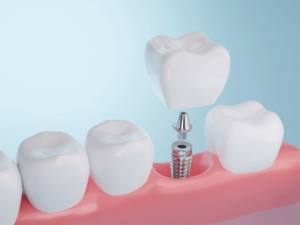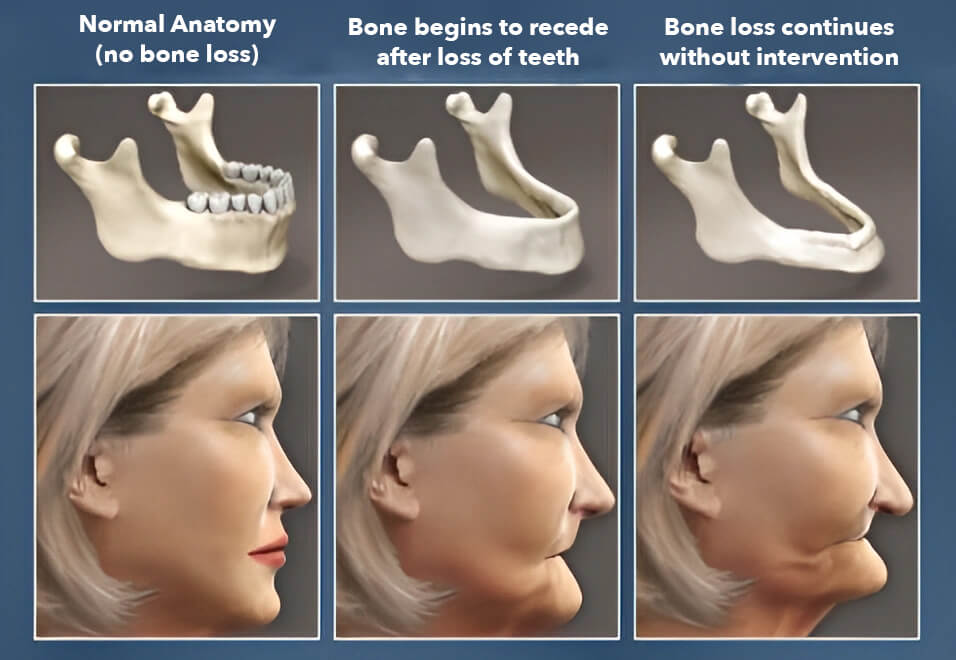Dental Implants in Boca Raton, FL
Dental implants are a very reliable source for effective tooth replacement. Whether you have lost one tooth or many, implants can provide a permanent solution that looks and functions normally. Learn about the implant process, cost, effects of bone loss without a dental implant, and get answers to common questions below.
Dental Implants at Harris Dentistry
A dental implant is an artificial root upon which a manufactured tooth can be placed. Implants are used to support the replacement of a single tooth, multiple teeth, or larger prostheses such as dentures, depending on the individual’s requirements and condition. Placement of the implant stabilizes bone levels and may prevent bone loss, resulting in greater long-term support, function, and esthetics. Implants are a superior way to replace missing teeth, as they do not require alteration of adjacent teeth. They are also an excellent way to stabilize a denture.

How Much Do Dental Implants Cost?
At Harris Dentistry, we provide high-quality, affordable dental care so our patients can always receive the treatment they need. The cost of dental implants can vary based on the materials used, insurance coverage, and other factors, such as whether bone grafts are required. Our office is always happy to provide you with estimates on the cost of a procedure after your initial consultation. The cost of dental implants is:
- Approximately $2,500 for a single tooth
We know many patients are concerned about cost, payment plan options, and insurance coverage when considering dental implants. Our staff is happy to work through these concerns with you so you can get the care you need. Many patients without insurance use our CareCredit or Sunbit financing options to help pay for treatments in smaller amounts over time.
Explore Our Financing Options

Bone Loss and Dental Implants
Dental implants stabilize bone levels and can prevent bone loss, resulting in better long-term support, function, and esthetics. Long-term reliance on dentures can lead to bone loss something that can be avoided with implant-supported dentures also called all-on-4s. Dental implants require less adjustment or shaving of surrounding teeth compared to other restoration methods such as dental bridges. They are also more flexible and provide a more natural feeling than bridges or full or partial dentures.
Meet Your Dental Implant Expert in Boca Raton, FL

Dr. Scott Harris
Dr. Scott Harris is passionate about providing the best quality care and education possible to all of his patients. That is why he actively pursues any opportunity to continue growing his expertise, including extensive post graduate education and an internship in Oral and Maxillofacial surgery at the University of Kentucky. Dr. Harris is also a fellow of the ICOI, the International Congress of Oral Implantologists.
-
What is the procedure for dental implants? Are dental implants safe?
The first step is having the dentist consult and visually examine the site in the mouth where the dental implant is being considered. Then the dentist needs to consider if any current teeth need to be extracted and which type of bone graft needs to be conducted. These procedures will take place first, and the patient will be allowed a few months to heal to ensure an adequate and strong bone is present at the site of the implant.
Once this is determined, the dental implant is placed into the bone (this surgical process takes about an hour for a single tooth), and a healing cap is placed over the implant to initiate the healing phase. This is followed by regular check-ups to ensure proper healing and no infection.
At Harris Dentistry, you're safety and comfort is our top priority. We only use high-quality, reputable implant companies. We do most implants using guided procedures which are less invasive, quicker, and with less post-operative pain.
-
What types of dental implants exist?
The most commonly used dental implants are endosteal implants. They are compromised of a titanium metal rod that is installed into the jawbone and a supporting post that is specifically designed to secure either a dental crown or a dental bridge. All-on-4 implants are a revolutionary dental implant system in which an entire top or bottom denture is supported on just four implants. Each implant is strategically placed so that the replacement teeth remain steady and secure. The advantage of using four implants is that it helps promote faster patient recovery and reduces the likelihood of complications from possible implant failure.
-
Are dental implants painful?
The most painful part of the dental implant process is extracting any teeth that implanted crowns will replace. However, any extraction will include anesthesia meaning little to no pain during the procedure and only a few days of recovery. Any pain experienced during recovery should also be manageable using over-the-counter medications such as ibuprofen.
-
Are there any aftercare instructions for dental implants?
Immediately after dental implant placement, you should be careful not to disturb the placement site. This means no chewing near the implant. It also requires very careful cleaning for several weeks to a month after placement. The dental implant takes several months to fuse to the jaw, so the fewer disturbances during that period the better. If you have a temporary denture to replace your missing dentition, the denture must not rub on the surgical site.
After implantation and possible extraction or grafting, you may experience typical discomforts associated with any oral surgery. These can include swelling, pain at the site, and minor bleeding. Below are some specific recommendations for the first 2 weeks after any procedure during this process to ensure proper healing and recovery.
Pain Management. Ibuprofen and Advil reduce pain and swelling and is highly recommended after surgery. Tylenol is also a great option for pain relief.
Oral Hygiene. Gentle brushing is important to keep the recovering area clean and to avoid irritation from overly aggressive brushing. Warm salt water rinses can also help keep the area clean and reduce pain and swelling.
Minor Bleeding. After oral surgeries, it’s common to have a small amount of blood in your saliva for a day or two. Gently biting on a gauze pad for 30 minutes can help with this. If bleeding continues for more than a few days, contact our office.
Swelling. Besides ibuprofen and saltwater rinses, using an ice pack for 20 minutes after surgery and 20 minutes at a time on the cheek near the affected area can help.
-
What are the benefits of dental implants?
A person suffering from tooth loss will experience many challenges. The most obvious of these challenges are difficulties when chewing and speaking clearly. When tooth loss is left untreated it can result in very serious problems like tooth shifts, jawbone deterioration, facial structure loss and bite imbalances. These issues usually develop over time when there is no root system to maintain bone health and alignment. Dental implants provide an artificial root system to maintain order and keep the remaining teeth in line.
They can not only help a patient overcome short-term challenges; they can also prevent long-term problems linked to tooth loss. They are the most effective method for treating tooth loss because dental implants serve as an artificial root system for supporting a prosthetic tooth and allow replacement teeth to feel more natural.
-
Can I replace all my teeth with implants?
Yes, by placing multiple dental implants in strategic positions in the jaw bones all of your teeth can be replaced. This process is typically called all-on-4 or all-on-x implants. These procedures can transform an unhealthy mouth with many lost or damaged teeth into an esthetic, functional, and healthy mouth.
More Questions?
If you have more questions about dental implants, please contact our office and we will be happy to discuss further.
